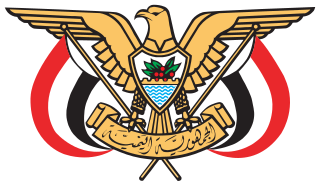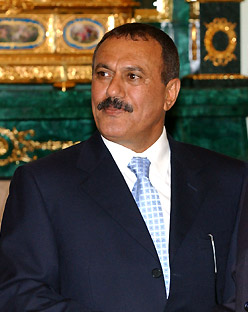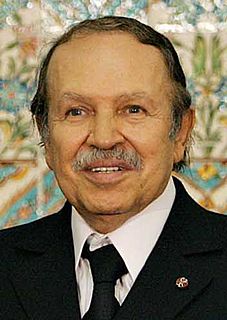
The Politics of Yemen are in an uncertain state due to the Houthi takeover in Yemen. An armed group known as the Houthis or Ansar Allah seized control of the Northern Yemeni government and announced it would dissolve parliament, as well as install a "presidential council", "transitional national council", and "supreme revolutionary council" to govern the country for an interim period. However, the deposed president, Abdrabbuh Mansur Hadi, has declared he is still in office and is working to establish a rival government in Aden.
Primary elections, often abbreviated to primaries, are a process by which voters can indicate their preference for their party's candidate, or a candidate in general, in an upcoming general election, local election, or by-election. Depending on the country and administrative divisions within the country, voters might consist of the general public in what is called an open primary, or solely the members of a political party in what is called a closed primary. In addition to these, there are other variants on primaries that are used by many countries holding elections throughout the world.

The Zimbabwe African National Union – Patriotic Front (ZANU–PF) is a political organisation which has been the ruling party of Zimbabwe since independence in 1980. The party was led for many years under Robert Mugabe, first as Prime Minister with the Zimbabwe African National Union (ZANU) and then as President from 1987 after the merger with the Zimbabwe African People's Union (ZAPU) and retaining the name ZANU–PF, until 2017, when he was removed as leader.

Yemen is a one party dominant state in which the General People's Congress (GPC) holds power.

The Socialist People's Party of Montenegro is a socially conservative social-democratic political party in Montenegro. Party is a founding member of the For the Future of Montenegro political coalition in August 2020. Coalition won 27 seats in the 81-seat parliament of Montenegro at the 2020 election, 5 of those belonging to SNP. The party is pro-European Union and anti-NATO.

Parliamentary elections were held in Sri Lanka on 2 April 2004. The ruling United National Party of Prime Minister Ranil Wickremesinghe was defeated, winning only eighty two seats in the 225-member Sri Lankan parliament. The opposition United People's Freedom Alliance won 105 seats. While this was eight seats short of an absolute majority, the Alliance was able to form a government.

Elections in Yemen take place within the framework of a presidential system, with both the President and House of Representatives elected by the public. Due to political instability, elections have not been held regularly since the early 2000s.

The Yemeni Socialist Party is a political party in Yemen. A successor of Yemen's National Liberation Front, it was the ruling party in South Yemen until Yemeni unification in 1990. Originally Marxist–Leninist, the party has gradually evolved into a democratic socialist opposition party in today's unified Yemen.
Faisal Othman Bin Shamlan was a Yemeni intellectual, technocrat, political reformist and public figure. He was a Yemeni member of parliament who had held the post of Oil and Mineral Resources Minister in the post-unification government of Yemen. Prior to the reunification of Yemen in 1990, Shamlan was the Minister of Infrastructure and Oil in the socialist government of South Yemen. He was the recognized presidential candidate of the Yemeni opposition coalition, a coalition which consists of the Islamist Islah, the Yemen Socialist Party and several smaller parties, in the 2006 presidential election, but was defeated by incumbent president Ali Abdullah Saleh.
Yemeni unification took place on May 22, 1990, when the area of the People's Democratic Republic of Yemen was united with the Yemen Arab Republic, forming the Republic of Yemen.

Presidential elections were held in Yemen on 20 September 2006, alongside local elections. Incumbent president Ali Abdullah Saleh of the General People's Congress received 77% of the vote, defeating opposition coalition candidate Faisal Bin Shamlan.

Legislative elections were held in Algeria on 17 May 2007. 24 political parties and around 100 independent lists with a total of more than 12,000 candidates competed for the 389 seats in the National People's Assembly. While most Algerians voted on May 17, immigrants from Algeria to other countries and Algerians living in the Sahara and other nomads and semi-nomads voted on May 16 due to the distance from Algiers, the country's capital.

Parliamentary elections were held in Yemen on 27 April 2003, having originally scheduled for 2001. The General People's Congress of President Ali Abdullah Saleh received 58% of the vote, winning 226 of the 301 seats.

Direct presidential elections were held in Yemen for the first time on 23 September 1999. Candidates had to be approved by at least 10% of the 301 members of the House of Representatives; however, in practice this meant that only two parties, the ruling General People's Congress (GPC) and Al-Islah had enough seats to nominate their candidates. However, al-Islah backed the GPC candidate, incumbent President Ali Abdullah Saleh rather than running a candidate of their own.

Sheikh Abdullah bin Husayn bin Nasser al-Ahmar was a politician and tribe leader of Yemen. He was the Speaker of the House of Representatives (Yemen) from 1993 to 2007 and also was the Sheikh of the Hashid tribal federation and the Al-Islah party.

Parliamentary elections were held in Algeria on 30 May 2002 to elect members of the People's National Assembly. The governing National Liberation Front (FLN) won a majority of seats in the election. The election suffered from a low turnout, violence and boycotts by some opposition parties.

General elections were held in Sudan between 11 and 15 April 2010, extended from the original end date of 13 April. The elections were held to elect the President and National Assembly of Sudan, as well as the President and Legislative Assembly of Southern Sudan. The election brought to the end the transitional period which began when the decades-long Second Sudanese Civil War ended in 2005.

The Yemeni Congregation for Reform, frequently called al-Islah, is a Yemeni Islamist party founded in 1990 by Abdullah ibn Husayn al-Ahmar, Ali Mohsen al-Ahmar, Abdul Majeed al-Zindani, Mohammed al-Yadumi and Yahya Rassam. The first article of Islah basic law defines it as "a popular political organization that seeks reform of all aspects of life on the basis of Islamic principles and teachings".

Legislative elections were held in Algeria on 10 May 2012. The incumbent coalition, consisting of the FLN of President Abdelaziz Bouteflika and the RND of Prime Minister Ahmed Ouyahia, held on to power after winning a majority of seats. The Islamist parties of the Green Algeria Alliance lost seats.

The Party of Truth is a Zaydi Islamist political party in Yemen.












